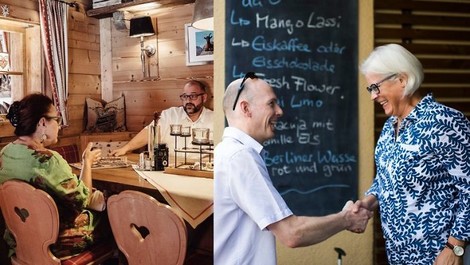Your podcast discovery platform
Curious minds select the most fascinating podcasts from around the world. Discover hand-piqd audio recommendations on your favorite topics.

piqer for: Global finds Doing Good
Michaela Haas, PhD, is the award-winning author of four non-fiction books, most recently Bouncing Forward: The Art and Science of Cultivating Resilience (Simon&Schuster). She is a member of the Solutions Journalism Network and writes a weekly solutions column for the German Süddeutsche Zeitung Magazin. Her articles have been published on CBS, the Washington Post, the Huffington Post, Daily Beast, and many other reputable media.
How To Talk To Your Enemy
My in-laws and I have stopped talking about politics since Trump won the primaries. We can't find common ground on anything from the Russian election interference to tax cuts for the rich or separating kids from their parents at the border.
Therefore I deeply admire the projects that are underway to get people from opposite sides of the political spectrum talking. Several news organizations are attempting to bridge the divide by inviting people with opposing opinions to learn about each others` viewpoints. “My Country Talks” by the German weekly Die Zeit is a truly impressive effort to create an antidote to the sociopolitical polarization, like a “political Tinder”. The results are encouraging: Zeit Online is now expanding "My Country Talks" into an open-sourced tool other organizations can use to facilitate civilized debate, and other media outlets are following suit.
I believe these efforts are not only wonderful, but necessary in our democracy. However, I highly encourage you to read this piece by Amanda Ripley on why these efforts often fall short and how we can do better.
Ripley spent three months interviewing experts in conflict resolution – mediators, psychologists, lawyers -, including the good folks from the “Difficult Conversations Lab” who have hosted hundreds of real-life debates. She offers surprising strategies on how to approach these difficult conversations on hot-button issues.
Journalists need to learn to amplify contradictions and widen the lens on paralyzing debates. We need to ask questions that uncover people’s motivations. All of us, journalists and non-journalists, could learn to listen better. As researchers have established in hundreds of experiments over the past half-century, the way to counter the kind of tribal prejudice we are seeing is to expose people to the other tribe or new information in ways they can accept. When conflict is cliché, complexity is breaking news.
